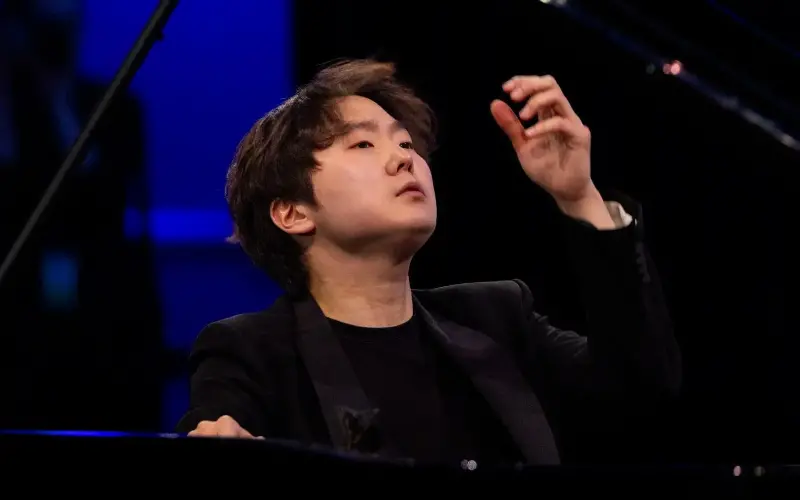
When young fans pack the Barbican on Thursday evening to hear Seong-Jin Cho perform a newly commissioned Korean piano concerto, it will mark the latest chapter in the phenomenon of the Asian super pianist. While Chinese-born Lang Lang and Yuja Wang still make headlines, a younger generation of pianists with the kind of followings usually associated with rock stars is increasingly represented by musicians from South Korea.
Since becoming the first South Korean to win the International Chopin Piano Competition in 2015, aged 21, Cho has meticulously honed his standing as a top-tier international pianist, most recently with his agile, sensitive recordings of Ravel’s piano works. When fellow South Korean, Yunchan Lim, became the youngest winner of the 2022 Van Cliburn competition with Rachmaninov’s Piano Concerto No 3, it proved to be the most-watched version ever of the piece on YouTube with 18m viewers.
It’s yet another example of how South Korean cultural exports have surged in Western consciousness since K-Pop famously led the advance a decade and a half ago. Award-winning films such as Parasite and Decision to Leave followed closely along with cult TV series Squid Game. Last year South Korean novelist Han Kang became the first Asian woman to win the Nobel Prize for literature and this summer animated movie KPop Demon Hunters zipped to the top of Netflix’s global charts. Yet while these have brought a distinctive Korean twist to their respective genres, the country’s classical musicians have increasingly tackled the West on its own terms.
Thierry Loreau’s fascination with Korean classical musicians’ soaring international profile led him to make two documentaries – The Korean Musical Mystery (2012) and K-Classics Generation (2020). For him, Cho’s victory at the International Chopin Piano Competition marked a major turning point. It was through filming the prestigious Belgian Queen Elisabeth Competition that he noticed that South Korea was becoming a classical music powerhouse.
“South Korea was one of the poorest countries in the world after the Korean War,” he says when we talk on Zoom. “Now it’s the 14th largest economy in the world and parents see classical music as an essential aspect of preparing their children to be good citizens. Unlike Europeans, who see childhood as a time to explore who they are, Koreans believe the first 18 years of your life are the time when you should train to learn music and languages. If you want to be a pianist that might mean practising for 10 hours a day, which doesn’t leave time for much else, but then you have the rest of your life to find out who you are.”
The pushy parent phenomenon is, of course, one that’s been observed across Asia and beyond. The “Lang Lang effect” is credited with inspiring 40 million Chinese families to urge their children on to similar success. Recent interviews have reminded us that Lang Lang’s own father told him to kill himself when his piano teacher predicted that the then nine-year-old wouldn’t get into Beijing’s Central Conservatory of Music.
Yet in South Korea, the impetus for children to learn classical music comes from the government level. For example, the Korean National Institute for the Gifted in Arts, which sponsors extensive training of children talent-spotted at elementary and high school level, opened in 2008.
Kirsty Harris, classical music programmer at the Barbican, thinks the impact is clear. “I have huge admiration for how the South Korean government approaches culture,” she tells me. “Its commitment hasn’t shifted for the last 30 years. Culture there is seen as part of being a complete person.”
Classical music’s omnipresence has translated into enthusiastic social media followings for winners of international music competitions – Cho currently has 238,000 followers on Instagram, while Lim has 106,000 subscribers on his YouTube channel. Lim is touted as classical music’s answer to K-Pop – his most devoted fans wear t-shirts emblazoned with his face.
Harris has witnessed how this generates swift ticket sales in concert halls, though she points out that social media is not the only factor. “Evgeny Kissin always sells out fast, as does Lang Lang,” she says. However, she believes that Seong-Jin Cho, like other Asian pianists of his generation “has a younger audience. So one consideration is to adjust ticket prices to keep them accessible.”
Further detail comes from a critic at Cho’s sold-out Barbican debut, who was so struck by the “turnout that could rival that [of] a football match” that he reviewed the audience too. “There were older people as well as toddlers, people dressed in fur (real or faux?) as well as tracksuits,” he wrote.
For Harris the factor still most guaranteed to sell out the Barbican Concert Hall is “the piano. At the Barbican, post-Covid, our recital audience figures haven’t come back for singers, for instance, who used to sell out in a heartbeat. But the piano is guaranteed to fill the hall. I’m sure it’s because so many people have tried to learn the piano at some point and touched on that journey for themselves”.
Certainly, whether for swooning fans of Liszt in the 19th century or ardent followers of legends like Martha Argerich and Arthur Rubinstein in the mid-to late-20th century, the piano has endured. Both intellectual and intimate, it retains the power to provide a thrilling path to a world of emotion as nuanced as it’s profound.
In Asia, that appeal is heightened because it’s also a symbol of internationalism and modernity. Other young pianists sparking enthusiasm include Japan’s Hayato Sumino, who performed Ravel’s Bolero on two pianos at the Proms, and Mao Fujita whose charismatic dispatch of Mozart’s 25th Piano Concerto at the Royal Festival Hall was rapturously received in March. Though when I ask Cho himself about who’s influenced him, it’s clear the motivation goes both ways. “Radu Lupu and Krystian Zimerman were major inspirations for me,” he replies. “Lupu’s playing was incredibly intimate and poetic, while Zimerman’s control and sound were just extraordinary. They both taught me that expression and depth matter more than pure technique.”
Cho’s response is, apart from anything, a challenge to the stereotype that Asian musicians are more impressive for rigorous craft than interpretation. According to Loreau, there was a moment in 2015 when he realised Korean musicians were valuing originality above execution. He made a second documentary K-Classics Generation, to understand the change.
He discovered there had been a decisive shift in the way that music was taught when he interviewed Kim Dae-jin, President of the Korea National University of Arts. “He told me that he’d been to a competition where he’d seen four Koreans play in a row,” he says, “and they were identical in their performance down to their clothes and the way they had their hair.”
He concluded, “OK, we were wrong. We have to do something else. What’s most important is the individual student – we have to explore their sensitivity and what they themselves have to express.” From 2015 onwards Korean wins in international music competitions increased exponentially.
I talk to Garrick Ohlsson, chairman of this year’s International Chopin Competition, where for the first time more competitors from Asia reached the penultimate round than from other countries. He won the competition in 1970, when the tiny minority of Asian competitors was dominated by Japan. “The world has changed gradually but profoundly,” he says. He notes that even though this year’s winner – Eric Lu – was American (only the second since himself), “almost all the American and Canadian competitors had Asian surnames”.
He’s fascinated that Western classical music’s future seems to be being driven from the East, “The interest of young audiences there is astounding.” That’s in contrast to the UK, where the Government’s announcement this month of an initiative to boost music education in schools comes in response to a steep decline in A-level music students since 2010, when the English Baccalaureate was introduced. There are glimmers of hope, but they are minimal. A Royal Philharmonic Survey in January found that under-35s listen to orchestral music more regularly than their parents.
So now we’re playing catch-up to South Korea. Cho enthusiastically describes the Schumann-inspired composition by fellow Korean Donghoon Shin (which he will play at the Barbican as the finale to the K-Music Festival) as a piece that brings “something fresh and important to the modern piano repertoire”. He pays tribute to Europe’s “deeper historical connection” with classical music. Yet for him it’s cause for celebration that young Korean audiences are making it part of their own “global movement”.
Seong-Jin Cho is at the Barbican Hall on Thursday November 20. Tickets: barbican.org.uk
